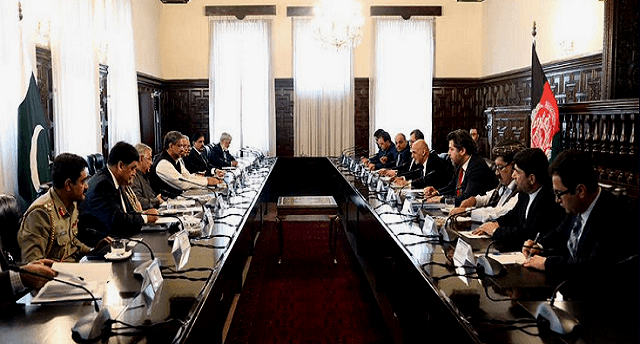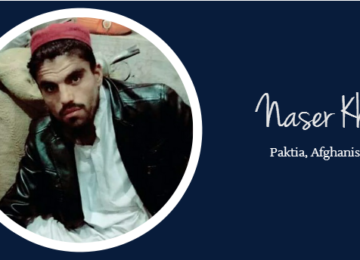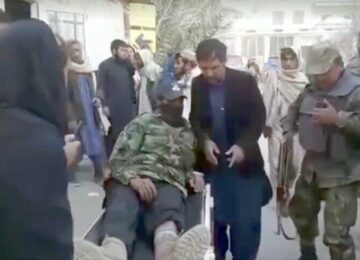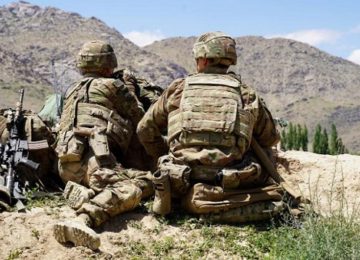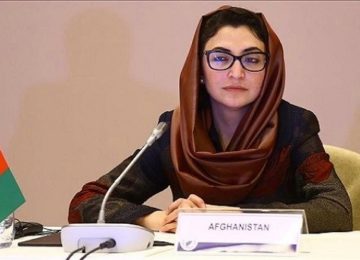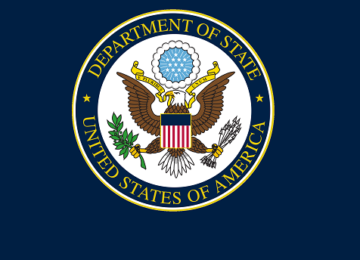Prime Minister Shahid Khaqan Abbasi and Afghan President Ashraf Ghani discussed the fight against militancy, the Afghan-led peace process, bilateral relations and regional connectivity as they met in Kabul on Friday.
Earlier in the day, Prime Minister Abbasi had landed in Kabul for a day-long visit to ease strained relations between the two countries and revive a push for peace talks with the Taliban.
PM Abbasi was welcomed by President Ghani. The two later inspected an honour guard at the Presidential Palace in Kabul before heading in for meetings.
The PM, accompanied by several other top Pakistani officials on the trip — his first to Kabul since becoming prime minister last year — was scheduled to meet with a string of Afghan officials, according to Ghani’s spokesman, Shah Hussain Murtazawi.
‘Current situation does not benefit anyone’
In the meeting between Afghan President Ghani and the prime minister, the two leaders discussed terrorism and the peace process in Afghanistan as well other measures, including the construction of railroad projects, prisoner exchanges and Afghanistan-Pakistan Action Plan for Peace and Solidarity (APAPPS), Afghanistan’s Tolo News reported, quoting a statement from Ghani’s office.
“Pakistan and Afghanistan have agreed on achieving the common aim of regional security through connectivity,” Radio Pakistan said about the meeting.
“The Afghan president reiterated that the current situation does not benefit anyone and that any concerns in this respect should be addressed through talks,” Tolo News reported.
He also shared details of alleged violations by Pakistan along the Pak-Afghan border.
The two sides agreed to creating a timeline and mechanism for repatriation of Afghan refugees living in Pakistan, the statement read.
“Pakistan’s connection to the Central Asia, energy transition, Quetta-Kandahar-Herat and Peshawar-Jalalabad railroad projects and construction of Peshawar-Jalalabad highway” also came under discussion, according to the statement.
Welcoming the Afghan government’s peace offer to the Taliban, Prime Minister Abbasi said an Afghan-led peace process “is the only way to stability in the country”.
He also extended Pakistan’s offer for cooperation for peace in Afghanistan and invited President Ghani for an official visit to Pakistan.
Separately, in a meeting with Afghan Chief Executive Abdullah Abdullah, the prime minister “discussed a range of issues, including peace and security, anti-terror efforts,” violations along the Pak-Afghan border and trade relations between the two countries.
“Abbasi said Islamabad will ease transport and exports of Afghanistan’s goods to Pakistan and that he hopes Afghan officials will do the same,” Tolo News reported, quoting a statement from Afghan official’s office.
Rejection of Kabul’s allegations
The visit, aimed at reducing tensions between the two neighbouring countries and further strengthening the Afghan peace process, comes in the backdrop of various accusations against Pakistan levelled by authorities in Afghanistan.
A day before the PM’s visit, Foreign Office Spokesman Dr Mohammad Faisal had taken to Twitter to reject Afghan allegations of illegal airstrikes conducted by Pakistan.
“Pakistani security forces are undertaking counter-terrorism operations in Bajaur Agency directed against terrorist groups who continue to attack Pakistan from their sanctuaries based on Afghan soil that have resulted in loss of lives and injuries on the Pakistani side,” Dr Faisal tweeted after Kabul alleged that Pakistan had conducted air strikes in the Afghan province of Kunar, causing “huge financial damage”.
He added that in a meeting of the director generals of military operations of the two countries, held in Rawalpindi on Thursday, Pakistan had shared details of the operations with the Afghan side, making clear that these operations were on the Pakistani side of the border.
Peace process
Last month, Foreign Minister Khawaja Asif had also extended support to Kabul’s proposed political process seeking to recognise the Taliban as a legitimate political group, and said Pakistan is ready for one-on-one talks with the Afghan Taliban.
President Ghani had proposed a ceasefire and release of prisoners as part of a range of options, including new elections involving the militants and a constitutional review as part of a pact with the Taliban to end a conflict that last year alone killed or wounded more than 10,000 Afghan civilians.
In return for Ghani’s offer, the Taliban would have to recognise the Afghan government and respect the rule of law, including the rights of women, one of the priorities for Afghanistan’s international partners.
This report originally appeared in Dawn Website on April 6, 2018. Original link.
Disclaimer: Views expressed on this blog are not necessarily endorsed or supported by the Center for Research and Security Studies, Islamabad.



